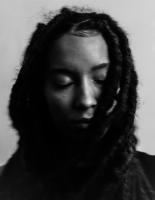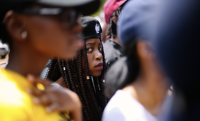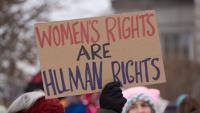 At its heart, MIXED is an exploration of racial and cultural identity. MIXED deals specifically with people that have mixed heritage, delving into the experiences of each subject that also echo his own. The series addresses the existential feeling of not fully belonging, while examining the cost of assimilation within society. The conversations focus especially on the contradiction of fitting in everywhere but nowhere at the same time and the resulting shoot is a collaboration that encompasses the themes considered.
At its heart, MIXED is an exploration of racial and cultural identity. MIXED deals specifically with people that have mixed heritage, delving into the experiences of each subject that also echo his own. The series addresses the existential feeling of not fully belonging, while examining the cost of assimilation within society. The conversations focus especially on the contradiction of fitting in everywhere but nowhere at the same time and the resulting shoot is a collaboration that encompasses the themes considered.
Stages
02.11.2022 | by Theo Gould
 Stuart Hall’s ironic use of “the west and the rest” is very real in the fixation among South Africans with “us” and “Africa”. It was encouraging that a sense of South Africa’s inextricable connectedness to the rest of the continent surfaced at moments in the FMF struggle. But the curiosity about and interest in African politics, literature, and academic knowledge still hasn’t really taken off, whether among students or established scholars.
Stuart Hall’s ironic use of “the west and the rest” is very real in the fixation among South Africans with “us” and “Africa”. It was encouraging that a sense of South Africa’s inextricable connectedness to the rest of the continent surfaced at moments in the FMF struggle. But the curiosity about and interest in African politics, literature, and academic knowledge still hasn’t really taken off, whether among students or established scholars.
Face to face
30.05.2022 | by Sean Jacobs
 The long history of advocacy around “women’s rights are human rights” features activists from the Global South and women of color in the US. For instance, in 1945, at the founding of the United Nations, Latin American feminists played a critical role in trying to advance “women’s rights” into the category of human rights. And after World War II, when the US Black freedom movement often deployed human rights arguments, Pauli Murray, the attorney, feminist, and civil rights advocate, argued specifically that “women’s rights are a part of human rights.” What changed at the end of the 20th century was that a far-reaching and expanding global feminist movement began to collectively use the idea that “women’s rights are human rights” to advocate for change at the United Nations and beyond.
The long history of advocacy around “women’s rights are human rights” features activists from the Global South and women of color in the US. For instance, in 1945, at the founding of the United Nations, Latin American feminists played a critical role in trying to advance “women’s rights” into the category of human rights. And after World War II, when the US Black freedom movement often deployed human rights arguments, Pauli Murray, the attorney, feminist, and civil rights advocate, argued specifically that “women’s rights are a part of human rights.” What changed at the end of the 20th century was that a far-reaching and expanding global feminist movement began to collectively use the idea that “women’s rights are human rights” to advocate for change at the United Nations and beyond.
Body
08.10.2021 | by Lisa Levenstein
 Today, tens of thousands of girls under the age of 18 were married off. Today, one in three women can expect to experience some form of physical or sexual violence in their lifetime. This needs to change, and it needs to change now. Each of these numbers tells a personal story and each one of these women or girls could have been my friend, my sister, my mother, my daughter, or me. That is what motivates me to create a better world for women and girls, no matter where they may be.
Today, tens of thousands of girls under the age of 18 were married off. Today, one in three women can expect to experience some form of physical or sexual violence in their lifetime. This needs to change, and it needs to change now. Each of these numbers tells a personal story and each one of these women or girls could have been my friend, my sister, my mother, my daughter, or me. That is what motivates me to create a better world for women and girls, no matter where they may be.
Face to face
14.12.2020 | by Regina Jane Jere and Natalia Kanem
 For the most part, prevailing definitions of gender in African studies have come from disciplines located within the Western body of knowledge. Scholars are often unaware how much these definitions are steeped in the mores and norms of the Judeo-Christian tradition, and the social conventions of European and European American cultures.
For the most part, prevailing definitions of gender in African studies have come from disciplines located within the Western body of knowledge. Scholars are often unaware how much these definitions are steeped in the mores and norms of the Judeo-Christian tradition, and the social conventions of European and European American cultures.
To read
01.11.2011 | by Nkiru Nzegwu
 Beyond Boetjan and the South African connection, occupation of one form or another has always been part of the collective psyche of Mozambique. Attempts to explore this, however, are far more recent. A new mixed media exhibition, Ocupações Temporárias (temporary occupations), sees five young Mozambican artists attempt to do just that.
Beyond Boetjan and the South African connection, occupation of one form or another has always been part of the collective psyche of Mozambique. Attempts to explore this, however, are far more recent. A new mixed media exhibition, Ocupações Temporárias (temporary occupations), sees five young Mozambican artists attempt to do just that.
I'll visit
01.10.2011 | by Dave Durbach
 Subjects like discrimination – by skin color, social position or gender- all found an important place in Ingrid’s work. Gradually she has been focusing on conflict issues and the reasons why we live in violence.
In addition to her interest in subjects like the war and the media she is also very interested in the role of women, their strength and their projection in the world. Regarding that she stats “we can’t run away from our body. At the beginning it was not an easy thing to do but I acquired consciousness that my black woman’s body is, by itself, a statement. Then I started to work on this matter”.
Subjects like discrimination – by skin color, social position or gender- all found an important place in Ingrid’s work. Gradually she has been focusing on conflict issues and the reasons why we live in violence.
In addition to her interest in subjects like the war and the media she is also very interested in the role of women, their strength and their projection in the world. Regarding that she stats “we can’t run away from our body. At the beginning it was not an easy thing to do but I acquired consciousness that my black woman’s body is, by itself, a statement. Then I started to work on this matter”.
Face to face
22.05.2010 | by Joana Simões Piedade
 At its heart, MIXED is an exploration of racial and cultural identity. MIXED deals specifically with people that have mixed heritage, delving into the experiences of each subject that also echo his own. The series addresses the existential feeling of not fully belonging, while examining the cost of assimilation within society. The conversations focus especially on the contradiction of fitting in everywhere but nowhere at the same time and the resulting shoot is a collaboration that encompasses the themes considered.
At its heart, MIXED is an exploration of racial and cultural identity. MIXED deals specifically with people that have mixed heritage, delving into the experiences of each subject that also echo his own. The series addresses the existential feeling of not fully belonging, while examining the cost of assimilation within society. The conversations focus especially on the contradiction of fitting in everywhere but nowhere at the same time and the resulting shoot is a collaboration that encompasses the themes considered.  Stuart Hall’s ironic use of “the west and the rest” is very real in the fixation among South Africans with “us” and “Africa”. It was encouraging that a sense of South Africa’s inextricable connectedness to the rest of the continent surfaced at moments in the FMF struggle. But the curiosity about and interest in African politics, literature, and academic knowledge still hasn’t really taken off, whether among students or established scholars.
Stuart Hall’s ironic use of “the west and the rest” is very real in the fixation among South Africans with “us” and “Africa”. It was encouraging that a sense of South Africa’s inextricable connectedness to the rest of the continent surfaced at moments in the FMF struggle. But the curiosity about and interest in African politics, literature, and academic knowledge still hasn’t really taken off, whether among students or established scholars.  The long history of advocacy around “women’s rights are human rights” features activists from the Global South and women of color in the US. For instance, in 1945, at the founding of the United Nations, Latin American feminists played a critical role in trying to advance “women’s rights” into the category of human rights. And after World War II, when the US Black freedom movement often deployed human rights arguments, Pauli Murray, the attorney, feminist, and civil rights advocate, argued specifically that “women’s rights are a part of human rights.” What changed at the end of the 20th century was that a far-reaching and expanding global feminist movement began to collectively use the idea that “women’s rights are human rights” to advocate for change at the United Nations and beyond.
The long history of advocacy around “women’s rights are human rights” features activists from the Global South and women of color in the US. For instance, in 1945, at the founding of the United Nations, Latin American feminists played a critical role in trying to advance “women’s rights” into the category of human rights. And after World War II, when the US Black freedom movement often deployed human rights arguments, Pauli Murray, the attorney, feminist, and civil rights advocate, argued specifically that “women’s rights are a part of human rights.” What changed at the end of the 20th century was that a far-reaching and expanding global feminist movement began to collectively use the idea that “women’s rights are human rights” to advocate for change at the United Nations and beyond.  Today, tens of thousands of girls under the age of 18 were married off. Today, one in three women can expect to experience some form of physical or sexual violence in their lifetime. This needs to change, and it needs to change now. Each of these numbers tells a personal story and each one of these women or girls could have been my friend, my sister, my mother, my daughter, or me. That is what motivates me to create a better world for women and girls, no matter where they may be.
Today, tens of thousands of girls under the age of 18 were married off. Today, one in three women can expect to experience some form of physical or sexual violence in their lifetime. This needs to change, and it needs to change now. Each of these numbers tells a personal story and each one of these women or girls could have been my friend, my sister, my mother, my daughter, or me. That is what motivates me to create a better world for women and girls, no matter where they may be.  For the most part, prevailing definitions of gender in African studies have come from disciplines located within the Western body of knowledge. Scholars are often unaware how much these definitions are steeped in the mores and norms of the Judeo-Christian tradition, and the social conventions of European and European American cultures.
For the most part, prevailing definitions of gender in African studies have come from disciplines located within the Western body of knowledge. Scholars are often unaware how much these definitions are steeped in the mores and norms of the Judeo-Christian tradition, and the social conventions of European and European American cultures.  Beyond Boetjan and the South African connection, occupation of one form or another has always been part of the collective psyche of Mozambique. Attempts to explore this, however, are far more recent. A new mixed media exhibition, Ocupações Temporárias (temporary occupations), sees five young Mozambican artists attempt to do just that.
Beyond Boetjan and the South African connection, occupation of one form or another has always been part of the collective psyche of Mozambique. Attempts to explore this, however, are far more recent. A new mixed media exhibition, Ocupações Temporárias (temporary occupations), sees five young Mozambican artists attempt to do just that.  Subjects like discrimination – by skin color, social position or gender- all found an important place in Ingrid’s work. Gradually she has been focusing on conflict issues and the reasons why we live in violence.
In addition to her interest in subjects like the war and the media she is also very interested in the role of women, their strength and their projection in the world. Regarding that she stats “we can’t run away from our body. At the beginning it was not an easy thing to do but I acquired consciousness that my black woman’s body is, by itself, a statement. Then I started to work on this matter”.
Subjects like discrimination – by skin color, social position or gender- all found an important place in Ingrid’s work. Gradually she has been focusing on conflict issues and the reasons why we live in violence.
In addition to her interest in subjects like the war and the media she is also very interested in the role of women, their strength and their projection in the world. Regarding that she stats “we can’t run away from our body. At the beginning it was not an easy thing to do but I acquired consciousness that my black woman’s body is, by itself, a statement. Then I started to work on this matter”.

